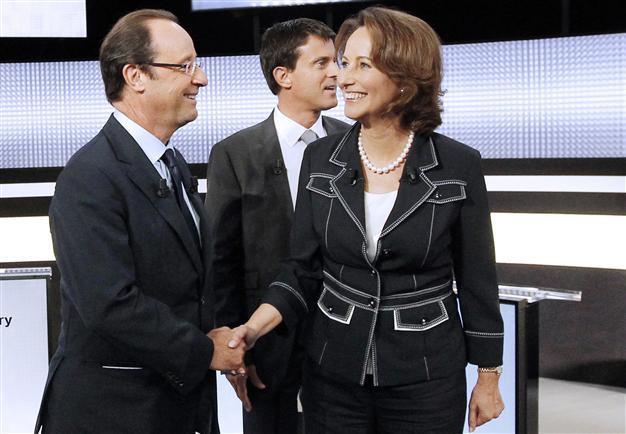Hollande's ex-partner Royal joins streamlined new government
PARIS - Agence France-Presse

Segolene Royal, right, French President Francois Hollande's former partner, has been named Wednesday April, 2, 2014 as Minister of Environment and Energy. AP Photo
French President Francois Hollande on Wednesday recalled his former partner Segolene Royal from the political wilderness to join a new streamlined government, days after his Socialist Party suffered an election drubbing.Sunday's stinging setback in nationwide municipal elections prompted Hollande to sack former premier Jean-Marc Ayrault and replace him with tough-talking interior minister Manuel Valls.
The two wasted no time in radically reshaping the government, appointing two new faces in a cabinet of just 16 ministers, less than half the 38 in the previous line-up.
Royal, Hollande's ex-partner and mother of his four children, was named ecology minister in a spectacular return to mainstream politics for the woman who lost the presidency to Nicolas Sarkozy in 2007.
Royal is one of the Socialists' biggest hitters but her inclusion in Hollande's first cabinet was reportedly blocked because of hostility from Valerie Trierweiler, the president's then girlfriend.
That obstacle has now been removed following Hollande's separation from Trierweiler in January in the aftermath of the revelation of his affair with actress Julie Gayet.
Pierre Moscovici, who as finance and economy minister was unable to pull France out of the economic doldrums, was replaced by two contrasting politicians.
Former labour minister Michel Sapin, a close Hollande ally and a supporter of budgetary rigour, was appointed to the powerful post of finance minister.
Left-wing firebrand Arnaud Montebourg, who as industrial renewal minister in the previous government drew strong criticism that he was anti-business, was named economy minister.
French Defence Minister Jean-Yves Le Drian and Foreign Minister Laurent Fabius, meanwhile, kept their posts.
The new government faces an uphill struggle, with the tough task of bringing down the country's jobless numbers which reached a record 3.34 million in February.
The ministers will have to deal with "an economic context that has deteriorated sharply", said Frederic Dabi of the Ifop polling institute, with a public deficit that remains stubbornly high after 22 months of Socialist rule.
Growth, meanwhile, is almost non-existent and the exasperation of the French was reflected in Sunday's municipal polls that saw the Socialists lose 155 towns and cities to the main opposition and far right.
Hollande has tasked Valls with implementing a package of pro-business policies known as the Responsibility Pact, which cuts taxes on firms that are widely viewed as hampering employment and growth, to be financed by spending cuts of 50 billion euros ($69 billion).
He also asked him to set in motion a new "Solidarity Pact" that would include steps to boost spending on education and health and reduce personal income taxes.
But some within the Socialist Party are deeply dissatisfied with the nomination of the 51-year-old Valls to the premiership.
The former interior minister is very popular with voters across the political spectrum but his style and politics, often compared to those of former British premier Tony Blair, have alienated more left-leaning members of the party.
Already, the Green EELV party jumped ship, announcing late on Tuesday that "EELV refuses to participate in a Valls government", despite the fact that the new premier offered to create an enlarged ministry overseeing the ecology, energy and transport that they could head up.
Economists say the critical question is whether the new government will continue to respect commitments to the European Union to reduce its public deficit from 4.3 percent to 3.0 percent of output, or put these targets aside and risk angering Brussels.
"I think France is well aware of its commitments. It's been given two years and there is obviously work to be done," Eurogroup chief Jeroen Dijsselbloem warned on Tuesday.
Analysts expected Valls to run a tight ship, with ministers kept on a tight rein.
Dabi said: "With Ayrault there was the feeling that he didn't really manage his government."
















